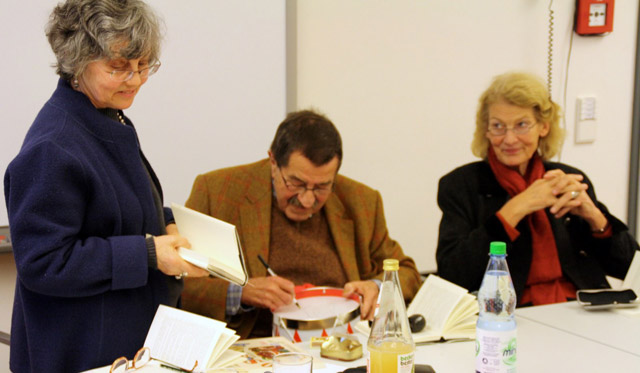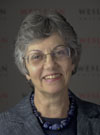5 Questions With . . . Krishna Winston on Art of Translation

This issue, we ask “5 Questions” of Krishna Winston, Marcus L. Taft Professor of German Language and Literature, dean of arts and humanities, on the art of literary translation. Winston has been the principal English-language translator for the works of the Nobel Prize-winning German author Günter Grass since 1990. Here Winston talks about the art of translation and working with a giant of 20th-century literature.
Q: How did you come to be the English-language translator of Günter Grass’s books?
A: I should explain that from 1960 until his death in 1992, the distinguished literary translator Ralph Manheim was responsible for translating almost everything Grass published, starting with The Tin Drum, which established Grass as the most provocative and brilliant writer to emerge from postwar Germany. After the Berlin Wall came down, because Manheim was in failing health, Grass’s American editor, Helen Wolff, asked my Wesleyan colleague Arthur S. Wensinger and me to do a collection of essays by Grass.
It was a rush job, because the book had to appear in time for the official unification of the two Germanys on October 3, 1990. Wolff had worked for many years with my parents, well-known literary translators, and I had translated a book on Joseph Goebbels that she published. The book of Grass essays, published as Two States-One Nation? gave me practice in rendering Grass’s very precise, often deliberately unusual language into English. By the time Too Far Afield came out in Germany, Manheim had died, and Grass’s American and British publishers had to find another translator. I was invited to submit a sample and was told I would be participating in a competition, which was rather intimidating.
Fortunately the chapter chosen for the sample provided a wealth of opportunities for me to strut my translational stuff: it was the section at the beginning of the book in which the Wall is breached, and the main character, the East German Fonty, and his Stasi handler, Hoftaller, observe the “wallpeckers” chipping away pieces of the Wall to sell as souvenirs. In that same chapter Fonty, who has a passion for Scotland, insists on celebrating his seventieth birthday at McDonald’s in the Western part of Berlin. The puns and other plays on words, literary and political allusions, and visual imagery offered the very kind of challenge on which I thrive. So I won the competition.

Q: Houghton Mifflin Harcourt recently published The Box: Tales From The Darkroom, the latest Grass book to be translated by you. What’s it about and were there any particular challenges involved in translating this work, as compared with other Grass books?
A: The Box could be described as the second installment of Grass’s autobiography, but, like the first installment, the controversial Peeling the Onion, it takes a highly imaginative approach, in the tradition of Goethe, who called his autobiography Dichtung und Wahrheit (Literature and Truth).
The central conceit is that “the old man” has charged his grown children, all of whom appear under altered names, with recording their memories and impressions of growing up with him as their father. Each chapter represents a gathering at the residence of one of the children, of whom six are Grass’s biological offspring and two joined the family when Grass married for the second time. At the beginning and end of every chapter, the old man inserts some introductory and summarizing remarks. The unifying metaphor is the box camera belonging to a family friend, the photographer Maria Rama. With this camera, Marie, as she is called in the book, photographs all sorts of material that the old man needs for his work, but the camera transforms reality into fiction; the pictures that emerge from the darkroom show hidden aspects of the past, transformed aspects of the present, or wished-for or dreaded images of the future.
What made this book particularly difficult to translate was the unusually heavy use of dialogue. Except for the old man’s comments, which are inserted in the third person, every chapter features the children talking, often interrupting each other, sometimes addressing each other by name, but usually identifiable only through the experiences or emotions they mention, the nicknames they use for each other, or their speech mannerisms. Much as I admire Grass, I have to say I think dialogue is his least strong suit. Because he strenuously avoids psychologizing, when he characterizes figures in his novels through their speech, he tends to equip them with catch phrases, and these phrases become tiresome. For instance, one of the sons repeatedly starts his comments with “Was soll’s!” (“Whatever!”), and each of the children has a different term for referring to the father: Vater, Väterchen, Vatti, mein Papa, and so forth. As the translator, who had to render each child’s pet expressions consistently, I was probably far more aware of, and irritated by, the repetition than a reader would be.
Q: How would you summarize the art of translation?
A: I’m glad you chose to call it an art, because people who have never tried their hand at literary translation or given it much thought often mistake it for a skill, like typing or simply looking up equivalents in a dictionary. In fact it is a highly complex act of cultural transfer that calls for superior knowledge of the source language, a wide repertory in the target language, a sensitive ear, knowledge of literary tradition, research skills, and the ability to enter into the world of a work and subordinate one’s own style and ideas to the author’s. The translator must be able to analyze the work and then render it into another language without losing too many of the culturally specific connotations of the original. The task involves both conscious and intuitive processes. It has a basis in craft, but is truly an art.
Q: What are your impressions of Grass as a person?
A: Having attended three of Grass’s translators’ seminars, I can say with certainty that Grass is not only a brilliant artist but also an honest, engaging, and thoroughly endearing person. He greatly enjoys being in the company of his translators, because he respects and appreciates our work and knows we understand his texts probably better than all but the most perceptive critics.
Grass took a tremendous beating in the press and the public for his revelation, in Peeling the Onion, that at 17 he had served (briefly) in the Waffen-SS, just as the war was ending. He also described himself as uncritical toward the Nazis in his boyhood and youth. But we have to remember that he was born in 1927, was not yet 7 when the Nazis came to power, and grew up in an environment where few even thought of resisting the regime. To me, what is important is that Grass has spent his entire career as a writer and as a political activist making amends for his own early obtuseness and trying to arouse the conscience of the world. What unsympathetic observers describe as his deliberate striving for publicity can be explained as his desire to keep past mistakes before people’s eyes so they can avoid making them again. And he does not go easy on himself. In Peeling the Onion and The Box he portrays quite mercilessly his failings as a son, a husband, and a father.
In the fall of 1995 I had the pleasure of participating in the translators’ seminar hosted in Göttingen by Grass and his German publisher, at which we went over the text almost page by page in preparation for the task ahead. Grass had started hosting these seminars, unique in the literary world, in the 1970s. I was able to bring along Christian Thorne ‘95, who at the time was studying in Berlin on a German Academic Exchange Service fellowship. Christian was taking a seminar on Grass’s novel with the young German scholar whom Grass had hired to do research in Berlin locales where Grass did not want to appear in person, lest he give away the subject of the novel. Christian, now tenured at Williams, served as my collaborator, providing invaluable commentaries and suggestions as I sent him batches of the translation.
Q: What’s your next project?
A: I am finishing the text and captions for a large volume of Grass’s graphic work – drawings, sculptures, water colors, etchings – which has accompanied or alternated with his writing over the last six decades. I am also working on Grass’s diary from the year 1990, when he criss-crossed Germany in the lead-up to unification, trying in his speeches to warn against the West’s swallowing up the East, but also preoccupied with the novel The Call of the Toad, which was taking shape in his head. After that come a large novel by Peter Handke and a shorter novel by Patrick Roth, who is still unknown in this country. As you see, many hours at the computer lie ahead!

